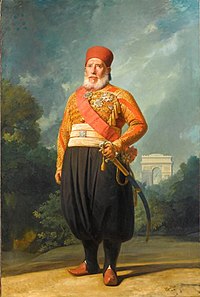Ibrahim Pasha of Egypt
| Ibrahim Pasha | |
|---|---|
|
Wāli of Egypt, Sudan, Palestine, Syria, Hejaz, Morea, Thasos, Crete 
|
|
| Reign | March 2, 1848 – November 10, 1848 |
| Predecessor | Muhammad Ali Pasha |
| Successor | Abbas I |
| Born | 1789 Drama, Ottoman province of Macedonia (part of modern day Greece) |
| Died | 10 November 1848 (aged 58–59) Cairo, Egypt Eyalet |
| Burial | November 10, 1848 (11 hours after his death) Mausoleum of Imam al-Shafi'i, Cairo, Egypt |
| Wives |
|
| Issue |
Mustafa Fazl Pasha Muhammad Bey Isma'il Pasha Ahmed Rifa'at |
| Arabic | إبراهيم باشا |
| Turkish | Kavalalı İbrahim Paşa |
| Dynasty | Muhammad Ali dynasty |
| Father | Muhammad Ali Pasha |
| Mother | Emina of Nosratli |
| Religion | Bektashi Order |
Wāli of Egypt, Sudan, Palestine, Syria, Hejaz, Morea, Thasos, Crete
Ibrahim Pasha (Turkish: Kavalalı İbrahim Paşa, 1789 – November 10, 1848) was the eldest son of Muhammad Ali, the Wāli and unrecognised Khedive of Egypt and Sudan. He served as a general in the Egyptian army that his father established during his reign, taking his first command of Egyptian forces when he was merely a teenager. In the final year of his life, he succeeded his still living father as ruler of Egypt and Sudan, due to the latter's ill health. His rule also extended over the other dominions that his father had brought under Egyptian rule, namely Syria, Hejaz, Morea, Thasos, and Crete. Ibrahim pre-deceased his father, dying 10 November 1848, only four months after acceding to the throne. Upon his father's death the following year, the Egyptian throne passed to Ibrahim's nephew (son of Muhammad Ali's second oldest son), Abbas.
Ibrahim remains one of the most celebrated members of the Muhammad Ali dynasty, particularly for his impressive military victories, including several crushing defeats of the Ottoman Empire. Among Egyptian historians, Ibrahim, his father Muhammad Ali, and his son Ismail the Magnificent are held in far higher esteem than other rulers from the dynasty, who were largely viewed as indolent and corrupt; this is largely the result of efforts by his grandson Fuad I of Egypt to ensure the positive portrayal of his paternal ancestors in the Royal Archives that he created, which were the primary source for Egyptian history from the 1920s until the 1970s. Today, a statue of Ibrahim occupies a prominent position in Egypt's capital, Cairo.
...
Wikipedia
